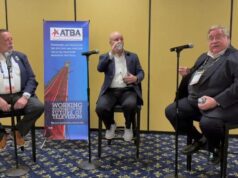
LPTV Station in Wichita Falls, Texas shares information/inspiration with North Texas
Christian Family Network Television, CFNT, has been around for close to twenty-five years serving the community of Wichita Falls, Texas as well as several smaller towns in the area. Station manager, and ATBA member, Rod Payne remembers the early days of when station management knew they had to make the move from a local cable channel to over-the-air broadcaster.
“A friend had read in something like ‘Popular Mechanics’ or some similar magazine that people were building and putting on the air low power television stations,” Payne said. “He figured with a few thousand we could take what had been our cable only channel and make it available to more people.
“Well, it took more than just a few thousand but by the Grace of God, we were able to raise the needed funds to go on the air debt free! We’ve basically never looked back.”
CFNT stations have since grown to include two Class A stations on the air carrying a variety of both national and local programming.
“From the very beginning, long before we had ever heard of any rules/regulations regarding local programming for the Class A designation, we knew one of the keys would be local programming that folks were not going to get from the full power stations in the market,” Payne said.
“We felt if we devoted more time to issues that affected the people right here in the area, we would be respected and supported by those same people,” Payne said. “So, while the larger stations were moving away from PSA’s, we were running them as often as we could along with programs that we originated that could address things that mattered to the people of north Texas.”
“That’s one of the major differences between a local, low-power and some of our bigger, full-power friends in the industry,” Payne said. “Our emphasis includes making sure we can make our bottom line to be financially prudent, but we don’t have the same size bottom line as a full-power station so we feel this gives us some degree of flexibility in both our programming and ad space.”
The station was the first to air locally originated Spanish language programming in the market. The “Good Neighbors” program has featured numerous non-profits over the years allowing them time to more fully explain their services and direction than would be found in a minute and a half news story.
“For example, we recently taped a show which demonstrates how folks in this area can get free help with their income taxes,” Payne said. “It’s important to get the information not only out there, but give the organization involved the full time they really need to explain the benefits of what they’re doing and how they can help our community.”
Payne believes that to be the bedrock of LPTV.
“My understanding was that was why low-power was initially adopted in the U.S. – to serve communities,” he said. “Now there are many LPTV operators and translators in the nation that are serving their communities by providing programming they would not have access to any other way but through those broadcasters. This includes local programming and national shows that just would not get the carriage on a full power station LPTV/translators and it all benefits underserved audiences all over the U.S.”
“We’re proud to be members of the ATBA for a number of reasons but one of the strongest is the respect this organization has among both other broadcasters as well as those in positions of responsibility in the government,” Payne said. “When the NAB not only listens to your group but takes action, that’s a strong vote of confidence. When representatives in Washington know you to be people of sound ideas and good faith, that means a great deal.
And future
plans for this station with a big heart?
“We’re going to keep firing up the cameras and feeding the transmitters to serve people, to share ideas and information and to continue a national dialogue that cannot be found anywhere else,” Payne said.













